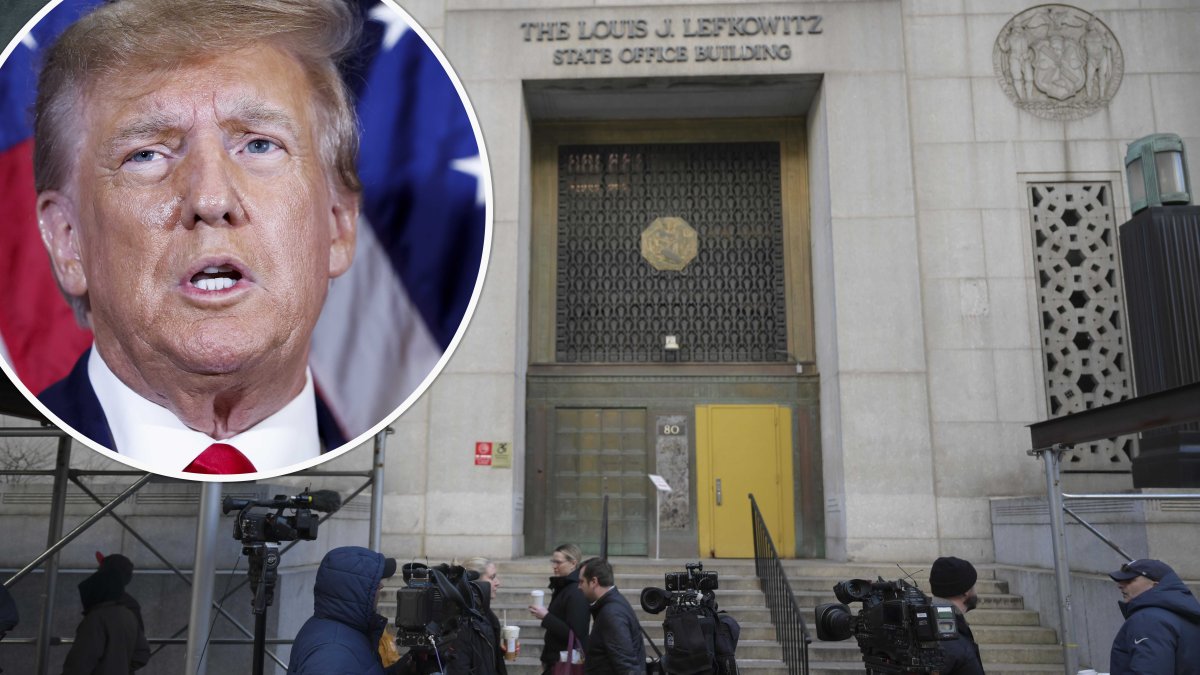What there is to know
- The Manhattan grand jury that weighed the charges against former President Donald Trump is not expected to vote this week on a possible indictment in the paid silence case, even though the timeline could change, three sources familiar with the state said Tuesday. ‘affair.
- Sources said Manhattan District Attorney Alvin Bragg is not expected to reconvene the 23-member panel until Thursday, when they say the panel is expected to address issues other than the Trump and Stormy Daniels case. .
- A day ago, the grand jury heard from David Pecker, former CEO of American Media and publisher of the National Enquirer.
NEW YORK — The Manhattan grand jury that weighed the charges against former President Donald Trump is not expected to vote this week on a possible indictment in the paid silence case, though the timeline may change, three sources said Tuesday. close to the file. matter.
Sources said Manhattan District Attorney Alvin Bragg is not expected to reconvene the 23-member panel until Thursday, when they say the panel is expected to address issues other than the Trump and Stormy Daniels case. . They did the same last Thursday after a meeting scheduled the day before was abruptly canceled. No reason was given.
A day ago, the grand jury heard from David Pecker, former CEO of American Media and publisher of the National Enquirer. This was his second appearance before a grand jury. Why did you appear before the grand jury again?
Pecker’s testimony may support Michael Cohen’s claim that the silent payments were not only personal, but also political, and were intended to contain and kill a story that could have impacted the Trump’s election.
In 2018, American Media Inc. admitted to paying $150,000 in secret money to former Playboy model Karen McDougal and porn star Stormy Daniels. A statement of admitted facts said AMI’s “primary purpose in making the payment was to suppress the woman’s story to prevent her from influencing the election.”
Federal prosecutors previously granted immunity to Pecker in their investigation of Cohen. A week before Pecker’s last appearance, Trump ally Robert Costello, who waived immunity, attempted to discredit Cohen in front of the grand jury.
The president had told the world he expected to be arrested last Tuesday. Seven days later, no arrests have been made and he has no impeachment vote either. And the world is still waiting.
Heightened concern over potentially violent protests following the attack on the US Capitol last year also appears to have subsided somewhat. Two senior law enforcement officials said Monday that an NYPD order ordering all officers to report to work in uniform in the event of a potential charge or chaos related to the protest had been rescinded.
The department continues to monitor events in Lower Manhattan. Protest activity has been largely muted in the absence of any movement in the case from Bragg or the grand jury, which has been secretly hearing evidence for months in the case.
It’s unclear whether Costello’s testimony, who could be prosecuted if he commits perjury, has influenced Bragg’s grand jury plans in recent days.
Trump loudly equated the Manhattan grand jury’s relative silence with “NO CASE.” He poked fun at Bragg on his social media platform for much of the past week and continued to do so on Truth Social early Monday.
Bragg’s office, which has received threatening letters in the mail potentially related to the case, declined to comment.
It’s unclear whether a potential organized action could escalate if the grand jury chooses to indict Trump, which would be the first indictment of a former US president or former president in history. But with deadly coverage of the January 6, 2022, uprising still looming, New York City police and law enforcement partners at all levels of government have prepared accordingly.
What happened? And what happens now?
Although the grand jury paused last week in its consideration of the case, former prosecutor Daniel Horwitz said he does not believe the delay resulted from doubts about the credibility of Cohen, who admitted and served a prison sentence for lying about paying the porn star.
“There’s a lot of criticism, questions about Michael Cohen. You know, a lot of white-collar business, almost all white-collar business is inside information,” Horwitz said.
Cohen says he is telling the truth about Trump and the forged documents to try to cover up the silent payments, which are not illegal. However, falsifying business records to protect a presidential campaign could be.
“After reviewing everything, if the prosecutor still believes the evidence supports the charge, I would expect Bragg to file those charges,” attorney Robert Gottlieb said.
Columbia law professor John Coffee suggested the law itself could be a problem for prosecutors, because even if the district attorney can prove Trump falsely charged Daniels the money needed to hide his silence , that would only amount to a misdemeanor. Earning a low-level felony conviction may require linking it to a federal crime.
“New York law says it’s a misdemeanor if you simply tamper with records. It’s a crime if you tamper with the record to hide a crime. But if the crime is a federal crime, it’s a different ball of wax,” Coffee said. “It is not entirely clear whether New York State has jurisdiction or authority to find a violation of a federal crime.”
Federal prosecutors had said the payments constituted illegal and undeclared aid to the Trump campaign. But they declined to press charges against Trump himself. The former president has denied all charges against him.

